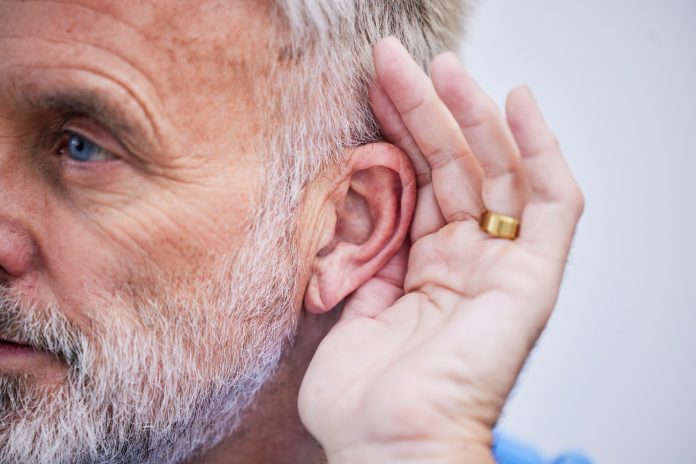Hearing loss is often called the invisible disability—unseen but deeply felt. It can affect anyone, from newborns just beginning to discover the world to seniors hoping to stay connected with loved ones. Despite its prevalence, hearing loss frequently goes untreated, leading to isolation, cognitive decline, and a diminished quality of life.
In Maryland and across the U.S., this silent issue touches millions. While the numbers speak volumes, the real impact is found in everyday moments missed—conversations, laughter, music, and connection.
Causes & Consequences of Hearing Loss
Hearing loss affects nearly 15 percent of adults in Maryland, with the risk increasing significantly with age—nearly 60 percent of adults over 70 experience hearing challenges, yet only a fraction use hearing aids, according to data from Johns Hopkins University and the CDC.
It is often perceived as a condition that comes with age, but in reality, it can affect anyone—regardless of life stage or lifestyle. While age-related hearing loss is common, genetics, trauma, noise exposure, and underlying medical conditions can all play a role. From newborns to centenarians, no group is immune.
Left untreated, hearing loss is far more than an inconvenience. It can significantly impact a person’s physical and emotional well-being. A study from John Hopkins Medicine revealed a strong link between untreated hearing loss and cognitive decline, including memory issues and an increased risk of dementia.
Social isolation is another major concern, as individuals may withdraw from conversations and daily interactions out of frustration or embarrassment. Hearing loss is also associated with a higher risk of falls due to reduced environmental awareness and balance control.
“There’s a greater risk of falls, a correlation with cognitive decline, and also social isolation—these are just some of the comorbidities associated with hearing loss,” said Dr. Rebecca Jahed, Clinical Audiologist and founder of Freedom Hearing Center, a full-service audiology clinic in Maryland.
Two common health conditions—diabetes and hypertension—have also been closely tied to hearing loss, due to the affect of irregular blood flow to the tiny vessels in the inner ear, potentially leading to permanent damage over time.
Breaking Barriers to Hearing Health in Maryland
For many, the high cost of hearing aids—often ranging from $2,500 to $8,000 per pair—has created a major barrier to care.
Maryland’s new legislation (House Bill 1339 and Senate Bill 778) requires insurers to cover up to $1,400 per hearing aid every 36 months for adults, expanding a benefit previously limited to children.
This law, alongside recent federal approval of over-the-counter hearing aids for mild cases, marks a major step toward making hearing healthcare more affordable and accessible, however for those with Medicare or who are underinsured, significant gaps still remain.
That’s where organizations like Freedom Hearing Center step in, offering not just clinical expertise, but compassionate, personalized and affordable care for patients of all ages.
“[While] they did pass this law this year, we still haven’t seen all the insurance companies come on board. So people that have Medicare as their primary— or only—insurance don’t have coverage at all,” said Dr. Jahed.
“Medicare will cover the testing, but not the treatment for hearing loss or the equipment…There’s often not even an option to add hearing as a benefit at all—such as with Medicare.”
To help overcome these barriers, Freedom Hearing offers a number of flexible financing options designed to work with patients, as well as supporting donations and community organizing.
“We have a donation program where people donate used hearing aids, so we can reprogram them for other people,” said Jahed. “Working with the Lions Club, helping qualified patients by donating our services and fitting the person at no cost to them. There’s also have the Charlie Busey Project, a raffle we run twice a year. We order whatever is appropriate—usually the top category—and fit the winner, covering the services ourselves.”
How Freedom Hearing Center Is Transforming Hearing Healthcare Across Maryland
Freedom Hearing Center began in 2014 with a mission to deliver compassionate, patient-focused hearing care to people of all ages and backgrounds. That vision now thrives in five locations across Maryland, serving a wide and diverse population.
“Freedom is a word that may represent a different meaning to each individual person… Our Center embodies all three meanings—service to country, spiritual connection, and the gift of communication restored through hearing,” says Pamela McIntyre, Director of Operations for the Center. She emphasizes that it’s this philosophy that sets the tone for the center’s mission: restoring more than just sound, but a sense of freedom, dignity, and connection.
Freedom Hearing Center offers a comprehensive range of services—from newborn hearing screenings to advanced cochlear implant evaluations and tinnitus treatments. The team prides itself on staying up to date with the latest technology and training, ensuring patients receive the best possible care.
Despite recent progress in legislation and the growing availability of over-the-counter options, there is still a widespread lack of awareness about the importance of hearing health. Many people wait years before seeking help, often unaware of the risks associated with untreated hearing loss.
When it comes to taking charge of your hearing health, begin by booking a hearing evaluation with a trusted hearing care provider—taking action early, whether for yourself or someone you care about, can significantly improve long-term outcomes.
Take the first step by booking a test or consultation with Freedom Hearing Center today!



